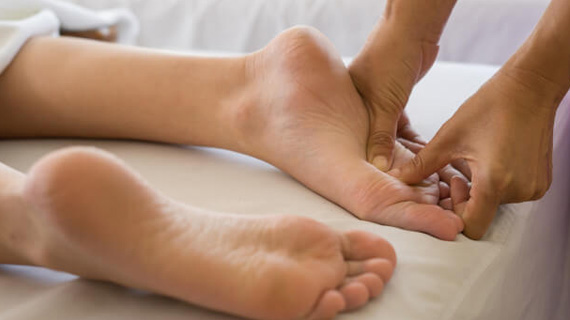
Neuropathy is a term that refers to general diseases or malfunctions of the nerves. Diabetes is a disease which is commonly associated with Neuropathy. Nerve damage caused by diabetes is one of the most common forms of neuropathy. This lead to numbness, pain and loss of sensation in the extremities.
At Rishi Ayurveda Hospital and Research Centre we have specialised treatment packages for neuropathic disorders. In many cases, the first manifestation of nerve damage occurs to the nerves of the feet.
This can lead to indications such as the sensation of pins and needles in your feet. Our unique treatment process exceeds your trust levels and provides eternal relief to the patients.
Major Symptoms of Diabetes Neuropathy:
- Sensitivity to touch
- Difficulty with coordination when walking
- Numbness or pain in your extremities
- Muscle weakness or wasting
- Nausea and indigestion
- Diarrhea or constipation
- Dizziness upon standing
- Excessive sweating
- Vaginal dryness in women and erectile dysfunction in men
Diabetes Neuropathy is majorly classified into 4 types. Patients can have one or more than one type of neuropathy at a time. The symptoms will vary on the type of neuropathy and the nerves affected by the same. Usually, symptoms develop gradually and which may not be noticeable till extensive nerve mutilation occur.
Peripheral neuropathy
Peripheral neuropathy is considered to be the most common type of diabetic neuropathy. It normally affects the feet and legs of the patients primarily, followed by the hands and arms. The symptoms of peripheral neuropathy are often worse during night, and may include any of the following:
- Numbness or reduced ability to feel pain or temperature changes
- Tingling or burning sensation
- Sharp pains or cramps
- Increased sensitivity to touch — for some people, even the weight of a bedsheet can be painful
- Muscle weakness
- Loss of reflexes, especially in the ankle
- Loss of balance and coordination
- Serious foot problems, such as ulcers, infections, and bone and joint pain.
At Rishi hospital we have developed a very result driven treatment process to overcome the ailments of peripheral neuropathy to a very great extent.More over the process of treatment is conceptualized with an intention to provide eternal relief to the patients within the minimum timeframe. The ceaseless efforts of our research team helped us to develop the unique treatment process.

Autonomic neuropathy
The autonomic nervous system controls your heart, bladder, stomach, intestines, sex organs and eyes. Diabetes can affect nerves in any of these areas, possibly causing:
- A lack of awareness that blood sugar levels are low (hypoglycemia unawareness)
- Bladder problems, including urinary tract infections or urinary retention or incontinence
- Constipation, uncontrolled diarrhea or both
- Slow stomach emptying (gastroparesis), causing nausea, vomiting, bloating and loss of appetite.
- Difficulty swallowing
- Increased or decreased sweating
- Problems controlling body temperature
- Changes in the way your eyes adjust from light to dark
- Increased heart rate at rest
- Sharp drops in blood pressure after sitting or standing that may cause you to faint or feel lightheaded
- Erectile dysfunction
- Vaginal dryness
- Decreased sexual response
At Rishi hospital we have an intensive pack of treatment processes to attend most of the symptoms of neuropathy. Based on the patient condition, family history and other genetical facts the treatments are decided. Regular monitoring and in-depth analysis are done at various levels by trained physicians to ensure the results for the treatment processes.
Radiculoplexus neuropathy (diabetic amyotrophy)

Radiculoplexus neuropathy affects nerves in the thighs, hips, buttocks or legs. It’s more common in people with type 2 diabetes and older adults. Other names for this type are diabetic amyotrophy, femoral neuropathy or proximal neuropathy.
Symptoms are usually on one side of the body, but sometimes may spread to the other side. You may have:
- Severe pain in a hip and thigh or buttock that occurs in a day or more
- Eventual weak and shrinking thigh muscles
- Difficulty rising from a sitting position
- Abdominal swelling, if the abdomen is affected
- Weight loss
Most people improve at least partially over time, though symptoms may worsen before they get better.
Mononeuropathy
Mononeuropathy, or focal neuropathy, is damage to a specific nerve in the face, middle of the body (torso) or leg. It’s most common in older adults. Mononeuropathy often strikes suddenly and can cause severe pain. However, it usually doesn’t cause any long-term problems.
Symptoms usually vanish without treatment over a few weeks or months. The specific signs and symptoms depend on which nerve is involved. Patients may feel pain in the:
- Shin or foot
- Lower back or pelvis
- Front of thigh
- Chest or abdomen
Mononeuropathy may also cause nerve problems in the eyes and face, leading to:
- Difficulty focusing
- Double vision
- Aching behind one eye
- Paralysis on one side of your face (Bell’s palsy)
Many a times mononeuropathy occurs when pressure is applied on a nerve (nerve compression). Carpal tunnel syndrome is a usual type of compression neuropathy in people with diabetes. It can cause numbness or tingling in your hand or fingers, except patient’s pinkie (little finger). Yet another symptom is the weakness in Patient’s hands which results in difficulty in holding things for a longer tenure.
The treatment at Rishi aimed at providing relief to those patients who are witnessing the symptoms of diabetes and it allied diseases. Come and experience the incessant relief through Ayurveda – The science of Life.
